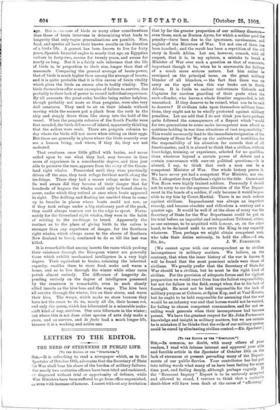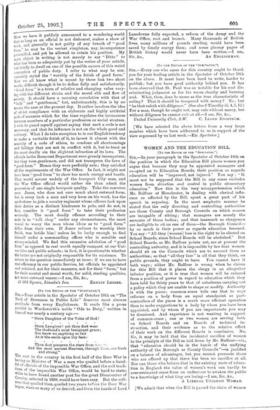[TO THE Moms 07 THH " SpicrATos."1 Srn,—In common, no
doubt., with many others of your readers, I read with intense interest and approval your able and forcible article in the Spectator of October 18th on the lack of sternness at present pervading many of the Depart- ments of our public Service. Your contributor has but put into telling words what many of us have been feeling for some time past, and feeling deeply, although perhaps vaguely. If the " Remount Inquiry " Report is to be seriously accepted and allowed to stand, I venture to think that a veritable, death-blow will have been dealt at the cause of " efficiency. Here we have it publicly announced to a wondering world that so long as an official is not dishonest, makes a show of work, and generally is not guilty of any breach of " good form," he may be the veriest simpleton, nay, incompetence personified, and yet be allowed to retain his position. My main object in writing is not merely to say " Ditto " to what has been so adequately put by the writer of your article, but briefly to dwell on one of the possible causes of this weird conception of public duty. I refer to what may be con- veniently styled the " worship of the fetish of good form." Now we all know what is meant by these last two short words, difficult though it be to define fully and satisfactorily. "Good form" is a term of relative and changing value vary- ing with the different strata and the moral ebb and flow of society. It should have a meaning correlative with that of "lady" and "gentleman," but, unfortunately, this is by no means the case at the present day. It rather involves the idea of strict compliance with an elaborate and highly artificial code of manners which for the time regulates the intercourse between members of a particular profession or social stratum. I wish to guard myself against saying that such a code is not necessary, and that its influence is not on the whole good and salutary. What I do take exception to is our English tendency to make a veritable fetish of it, to invest it almost with the sanctity of a code of ethics, to condone all shortcomings and failings that are not in conflict with it, but to treat as the most deadly sin the slightest infraction of its laws. The officials in the Remount Department were grossly incompetent, but they were gentlemen, and did not transgress the laws of "good form." Hence they were perfectly safe ; they satisfied all the requirements of the War Office. In fact, it might not have been " good form " to show too much energy and bustle. That would savour unduly of the bourgeois City man, and the War Office official would rather die than admit the possession of one single bourgeois quality. Take the converse case. Jones, who does not care much about outward form, but is every inch a man and very keen on his work, has the misfortune to join a cavalry regiment whose officers look upon their duties as a distinct hindrance to polo, and do not, in fact, consider it " good form " to take their profession seriously. The most deadly offence according' to their code is to " talk shop " under any circumstances, the most venial to worry the man whose ideas as to "good form" differ from their own. If Jones refuses to worship their fetish, woe betide him! unless he be lucky enough to find himself under a commanding officer who is sensible and strong-minded. We find this excessive adulation of "good form" as opposed to real worth equally rampant at our Uni- versities and public schools ; in fact, it is questionable whether the latter are not originally responsible for its existence. To return to the question immediately at issue : if we are to have real efficiency in our public Service, let officials be appointed and retained, not for their manners, not for their " form," but for their mental and moral worth, for solid, sterling qualities, not mere outward veneer.—I am, Sir, &c., 15 Old Square, Lincoln's Inn. ERNEST LESSER.
[TO TUE EDITOR OP TUE "SPECTATOR."] 8111>—"Your article in the Spectator of October 18th on "The Need of Sternness in Public Life" deserves most sincere gratitude from every Englishman. It reads like a prose Parallel to Wordsworth's noble " Ode to Duty," written in time of war nearly a century ago
" Stern Daughter of the Voice of God!
Stern Lawgiver! yet thou dost wear The Godhead's most benignant grace; Nor know we anything so fair As is the smile upon thy face: • - -----
Thou. dost preserve the stars from wro ; And the most ancient Heavens, through Thee, are fresh and strong."
The cost to the country in the first half of the Boer War in having as Minister of War a man who quailed before a hand- ful of officials of the impossible War Office, and the evil tradi- tions of the impossible War Office, would be hard to state; while to have found another post for the great Dismounter of Cavalry, selected in 1899, would have been easy. But the soft- ness that quailed then, quailed two years before the Boer War began, when so many of us desired, and from the hands of Lord Lansdowne fully expected, a reform of the Army and the War Office, root and branch. Many thousands of British lives, many millions of pounds sterling, would have been saved by timely energy then; and some gloomy pages of British history would never have been written.—I am,











































 Previous page
Previous page